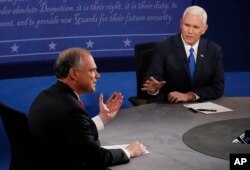When Republican Mike Pence and Democrat Tim Kaine sat across from each other Tuesday night, voters in the U.S. got their first actual debate about the policies Donald Trump or Hillary Clinton would pursue if elected the next country's next president.
It was the first and only time the two vice presidential candidates will directly face off before the November 8 election, and the free-flowing format allowed them to push back against their opponent's statements and press discussion on issues like criminal justice reform and what the U.S. should do in Syria.
"It stands in contrast to the first presidential debate, which was very personally oriented, very focused on scandals, very focused on guttural politics and not so much about what the future of America is going to look like," said John Hudak, senior policy fellow at the Brookings Institution.
Watch video report from VOA's Jim Malone:
Kaine and Pence talked over each other so often that at several points moderator Elaine Quijano chided them, including once saying that nobody watching at home could understand what they were saying.
Lisa Spies, president of the LS Group and a former finance director for Pence during his time in Congress, said those exchanges could be irritating but that voters did benefit by learning more about each campaign.
"We got details, we got facts, we got numbers," she told VOA. "During the presidential debate, we had adjectives and adverbs and we had insults thrown at each other and name-calling at each other. Tonight, even though there were interruptions, they were both stating what their policies would be."
Not surprisingly, both Clinton and Trump gave glowing review to their running mates.
Kaine repeatedly asked Pence during the debate to defend statements Trump has made on the campaign trail, something Clinton officials said Pence was unable to do.
"The person at the heart of this campaign and the heart of this debate was Donald Trump, and Mike Pence didn't show up to defend him," said Clinton campaign manager Robby Mook.
Pence accused Kaine of using an "avalanche of insults," and when Kaine attacked Trump's personal tax records, Pence said the businessman utilized a tax code that is designed to encourage entrepreneurs.
After the debate, Trump's senior communications advisor Jason Miller suggested the Clinton campaign is obsessed with Trump's taxes.
"The fact that the Clinton-Kaine ticket that that's all they have to talk about at this point or some other version of the insults they were throwing around tonight, that shows that they're running a pretty limited ground there with trying to drive any attacks against us," Miller said.
During the first presidential debate, Trump faced criticism for his interruptions of Clinton, a dynamic that was sharply different Tuesday, particularly early on with Kaine interrupting Pence more often.
"What Kaine sought to do tonight was be the attack dog and attempt as best he could not let Pence get away with stretching the truth or misstatements," Hudak told VOA. "And I think that effort was probably a strong one, he also likely came on a little too strong at times."
Spies said Kaine appeared too defensive, and that Pence was more of a calming force.
"He (Kaine) seemed a bit jumpy and on edge, and that kind of is unsettling as a voter when you’re watching them because you want someone who is going to kind of calm your nerves," she said.
Trump and Clinton return to the debate stage Sunday with a slightly different format that will involve some questions from audience members.
Spies said she does not expect a continuation of the substantive, policy-oriented discussion from Tuesday.
"Tonight we saw what should be a presidential debate," she said. "Not a vice presidential debate, but a presidential debate. I’m not sure what circus we’re going to see on Sunday."










